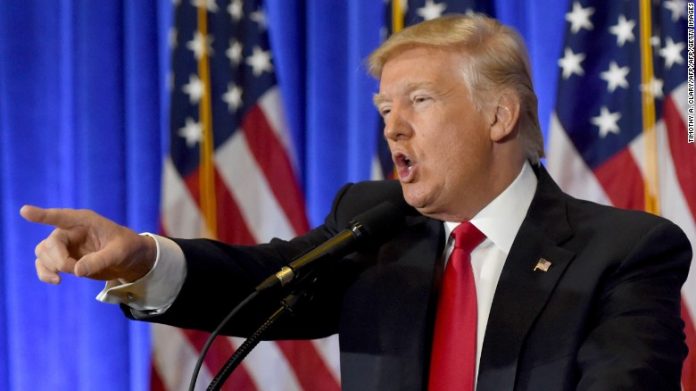
President Donald Trump on Friday plans to sign two executive actions that will launch reviews of U.S. trade policy, the latest in a series of measured steps that could lead to a revamp of the way the U.S. engages with the global economy.
Both executive actions could serve as preludes to more severe White House decisions regarding tariffs and trade agreements, but on their own they reflect a marked softening from the heated trade jabs Trump used on the campaign trail, when he threatened to enter into trade wars with Mexico and China.
Still, the executive orders will come one week before Chinese President Xi Jinping visits the new U.S. president, and Trump put Xi on notice Thursday when he wrote in a series of Twitter posts that he plans to have “difficult” conversations with his Chinese counterpart about trade issues.
The first executive action will direct the Commerce Department and a new White House trade council to “identify every form of trade abuse and every nonreciprocal practice that contributes to the U.S. trade deficit,” Commerce Secretary Wilbur Ross told reporters Thursday.
The trade deficit is the difference between a country’s imports and its exports. The United States has large trade deficits with a number of countries because it is so wealthy and imports goods from countries where products can be manufactured more cheaply. Trump has said that trade imbalances with Mexico and China are because those countries take advantage of the United States and he has called for taking a much tougher stance with each of them, threatening them with new tariffs and taxes.
“So what this report will do is within 90 days, come back to the president with the detailed causes by country and by major product,” Ross said.
Ross said the executive action wasn’t meant to single out China or any other country, but he did mention the large gap between what the United States imports from China compared with what it exports to China, something Trump has railed about for more than a year.
Other countries that he said could be reviewed are Japan, Germany, Ireland, Vietnam, Italy, South Korea, Malaysia, India, Thailand, France, Switzerland, Taiwan, Indonesia, and Canada.
“So we’re going to be very busy during the next 90 days trying to trace through the intricacies of each of these events,” he said.
He said the analysis “will demonstrate the depth of the administration’s intention not to hip-shoot, not to do anything casual, not to do anything abruptly, but to take a very measured and analytical approach both to analyzing the problem and, therefore, to developing the solutions for it.”
The second executive action will prompt a review of the United States’ practice of what the White House says is an “under-collection” of anti-dumping and counterveiling duties.
“Dumping,” in trade parlance, is when one country unloads excess inventory in a way that harms another country. For example, if China manufactures excess steel and tries to sell it at a discounted price in the United States, it could unfairly harm the U.S. steel industry. The United States has anti-dumping duties in place to prevent this sort of behavior, but the new executive action will study why these duties aren’t always being enforced.
“The problem here is that this isn’t just money lost to the Treasury,” Peter Navarro, who heads the White House National Trade Council, told reporters. “It’s the fact that the domestic workers and the domestic manufacturers who were supposed to be being defended against these unfair trade practices were not being defended because of this under-collection.”
The executive actions come as the White House has begun discussions with lawmakers on Capitol Hill aimed at beginning the process of renegotiating the North American Free Trade Agreement, a trade deal that went into effect in 1994 and Trump has said must be rewritten.
During the campaign, Trump touted his “economic nationalism” message by saying the United States must do more to protect American workers even if that meant adopting a more adversarial relationship with foreign governments. He promised to label China a “currency manipulator” on his first day in office, but he has since declined to follow through on that threat.
Still, Treasury Secretary Steven Mnuchin sent a message to foreign leaders at a recent gathering of global finance ministers in Germany when he refused to agree to past language that stipulated the United States and other governments would take steps to fight protectionism.
White House officials have said they don’t plan on adopting protectionist policies but they will retaliate against other governments if they think trade policies are negatively affecting American workers.
(c) 2017, The Washington Post · Jenna Johnson, Damian Paletta

